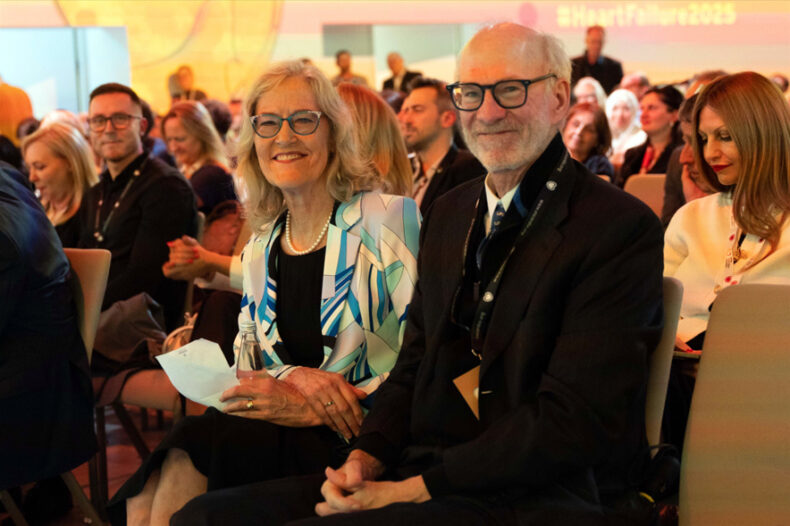Lynne Warner Stevenson, MD, Lisa M. Jacobson Professor of Cardiovascular Medicine, has received the Lifetime Achievement Award from the Heart Failure Society of America (HFSA) for her contributions to the field of heart failure (HF). The award was presented to Stevenson and co-awardee Inder Anand, MD, PhD, professor of Medicine at the University of Minnesota, at the recent HFSA Annual Scientific Meeting in Denver.

The award honors Stevenson, an internationally recognized pioneer and expert in the field of heart failure, for an exemplary career in scholarship, investigation, teaching and leadership.
“I would like to express my gratitude to the scholarly giants who came before there was a field of heart failure,” Stevenson said. “I am indebted to the colleagues with whom I have shared an exhilarating journey, most recently with those at Vanderbilt, and to the many fellows whom I have been privileged to train, whose work has lifted me to this honor.”
Stevenson, who joined the faculty in 2017, received her undergraduate degree in biochemistry from Princeton University and her MD from Stanford University prior to completing residency and fellowship at University of California, Los Angeles. She was the cardiologist launching heart transplantation in Los Angeles and also the Ahmanson-Cardiomyopathy Center at UCLA. She was director of Heart Failure at Brigham and Women’s Hospital in Boston, and now of the Cardiomyopathy Program at Vanderbilt University Medical Center.
Throughout Stevenson’s career in HF, she has been inspired by the outcomes of heart transplantation, with progressive growth at Vanderbilt under the leadership of Mark Wigger, MD, assistant professor of Medicine; JoAnn Lindenfeld, MD, professor of Medicine; and now Kelly Schlendorf, MD, MHS, associate professor of Medicine and medical director of VUMC’s Adult Heart Transplant Program.
In parallel, Stevenson has focused on ensuring that patients with heart failure receive appropriate therapies from the early stages through the late stage at which transplantation, mechanical circulatory devices or palliative care should be considered. She hopes that the new progress in understanding genetic heart disease at Vanderbilt will allow earlier therapy to eventually save more hearts from transplantation.
Stevenson’s research themes include the detection and relief of congestion in HF, profiling of patient journeys to guide therapy, and patient-centered outcomes for shared decisions. Her journey is marked by leadership roles in trials sponsored by the National Heart, Lung and Blood Institute (NHLBI) including the HF Network Trials and participation in the original design of the INTERMACS Registry of mechanical heart support and the MEDAMACS and REVIVAL registries for “less sick” patients.
Stevenson has served on the Food and Drug Administration’s Cardio-Renal panel and Medicare advisory panels, helped to launch Circulation Heart Failure, and serves as associate editor of the Journal of the American College of Cardiology. She has contributed to more than 30 national guidelines covering heart transplantation, heart failure, heart rhythm devices and advanced decision-making.
In addition, Stevenson shares patients and continues to learn about the interaction between rhythm and heart function with her husband, Bill Stevenson, MD, professor of Medicine and a pioneer in ablation for life-threatening heart arrhythmias.
When Stevenson began her career 37 years ago, heart failure was not seen as a field. She now considers her greatest career opportunity to have been to work with colleagues in Los Angeles, Boston, and now, Vanderbilt. She credits her success to the hard work of so many gifted fellows with whom she has worked as this field emerged. She has trained almost 60 fellows in advanced HF, half of whom are women, and created two NHLBI networks of young investigators. She remains strongly committed to teaching interns, residents and fellows to listen and connect to patients, monitor heart disease to guide intervention, and translate trial evidence into personalized care for quality and length of life.
In view of the remarkable progress made by HFSA and others to improve outcomes in chronic heart failure (CHF), Stevenson feels that “failure” is no longer the right term for many patients. She hopes that the label CHF in the outpatient clinic can someday be re-defined as ‘challenged heart function” rather than failure, as both patients and providers would rather accept a challenge than show up for failure.











